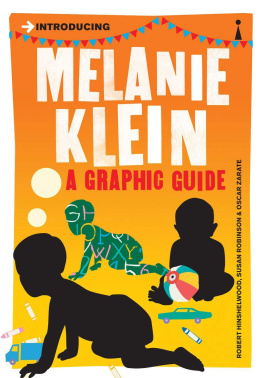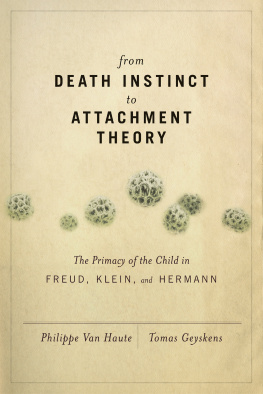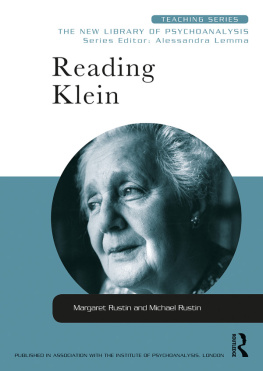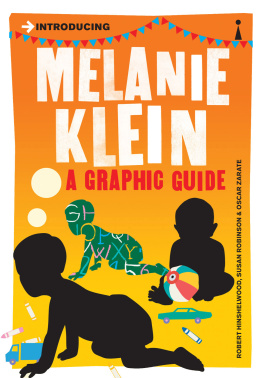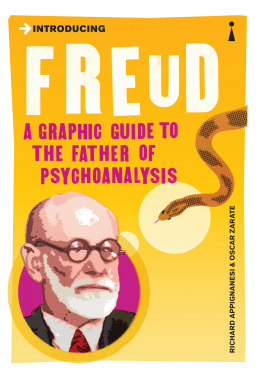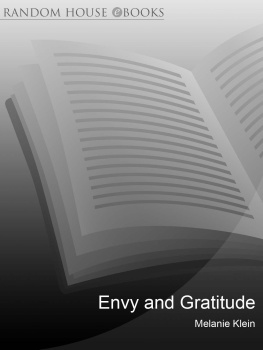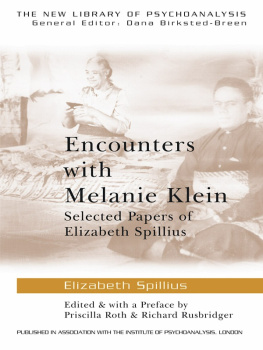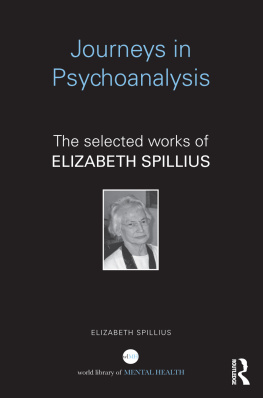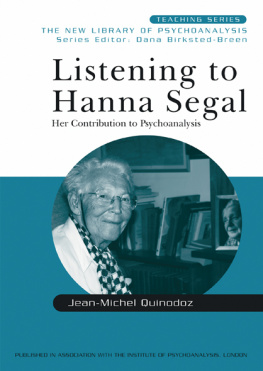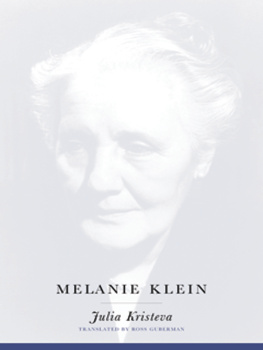Published by Icon Books Ltd, Omnibus Business Centre, 3941 North Road, London N7 9DP
email:
www.introducingbooks.com
ISBN: 978-184831-779-6
Text copyright 1997 Robert Hinshelwood and Susan Robinson
Illustrations copyright 2013 Icon Books Ltd
The author and artist have asserted their moral rights.
Originating editor: Richard Appignanesi
No part of this book may be reproduced in any form, or by any means, without prior permission in writing from the publisher.
Contents
Introducing Melanie Klein
Melanie Kleins work was always uncompromising. She was determined to get to the most hidden depths of the human mind. Because she often unearthed such challenging aspects of ourselves, her writing might seem at first difficult and upsetting. She was aware that the concealed terrors and bliss of infancy would not find easy acceptance. Description of such primitive processes suffers from a great handicap. These phantasies arise at a time when the infant has not yet begun to think in words. Nevertheless, she believed that the health of the human race in the future depended on these levels of the mind becoming accessible and accepted.
Melanies Childhood
Born on 30 March 1882 in Vienna, Melanie felt unwanted as the youngest of the four children of Dr Moriz Reizes and Libussa Deutsch. Her father was orthodox Jewish, had been married before, and was 24 years older than Libussa, a reported beauty. He was not a particularly successful general practitioner.
I SUPPLEMENTED THE FAMILY INCOME BY WORKING IN A DENTAL PRACTICE AND AS ATTENDING PHYSICIAN TO A VAUDEVILLE ACT.
Libussa, out of keeping with the times, ran a shop for a while. Their children, Emilie born 1876, Emanuel in 1877, Sidonie in 1878, and Melanie, were all destined to have either brief or difficult lives. Sidonie died of tuberculosis aged eight (Melanie was then four), and Emanuel too died of tuberculosis, but at the age of twenty-five. Emilie survived childhood, but made a poor marriage to an alcoholic gambler.
Early Sorrows
Melanie, the only child not breast-fed by mother, had a wet nurse. Her father openly favoured Emilie. Clearly this start could have influenced Melanie in her desire to make sense of child development and depression.
Her psychoanalytic contributions uniquely stressed the raw, painful emotions of rage, envy and hatred as well as creativity, and she attributed such powerful feelings to children. She particularly stressed the very earliest relationship of all to the mothers breast.
Education and Marriage
Melanie longed for her fathers approval, and above all to achieve this through intellectual success. She entered the Vienna Gymnasium at sixteen and hoped to become a doctor like him. This changed when he died two years later in 1900. Emilie, recently wed, moved into the household with her alcoholic husband Leo Pick who continued the medical practice and supported the family. Libussa was a young and energetic widow.
I HAD LITTLE ELSE TO DO BUT PLAN AND ORGANIZE MY CHILDRENS LIVES.
Next she sent Emanuel, ill with tuberculosis and addicted to drugs and alcohol, off to travel in Europe and pursue his ideal of a young sick artist.
Melanie admired this romantic brother and constantly strove for intellectual equality with him, and thus the approval which she had not gained from her parents. It was Emanuel who introduced her to Arthur Klein, her future husband.
ARTHURS INTELLECTUAL PROWESS MAKES HIM A GOOD CATCH.
BUT MARRIAGE MEANS THE END OF MY ACADEMIC STUDIES AND MY AMBITION TO BE A DOCTOR.
She seemed to accept this deal, probably under pressure from Libussa, to settle down and help relieve the financial burdens of the family.
A Destiny of Travel
Three months after the death of her brother Emanuel in December 1902, she married Arthur. This resulted in continual travelling in connection with his job as an engineer. A year later, in 1904, Melanies first child Melitta was born. She nursed the baby for seven months, until Arthurs work took them both away and Melitta was cared for by Libussa and nannies.
I BECAME DEPRESSED DURING MY SECOND PREGNANCY. HANS WAS BORN IN 1907.
MENANIES DEPRESSION BECAME SO SEVERE THAT I MOVED IN.
I MOVED THE FAMILY TO SILESIA.
The notion of travel as an antidote to depression seems to have been strong in the family and may have contributed to some of Melanies later significant moves. For the two-and-a-half years that the Kleins lived in Silesia, Melanie was more often than not away.
SHE WAS ABSENT FOR PERHAPS THE MOST SIGNIFICANT AND DRAMATIC MOMENTS IN THE LIVES OF HER TWO OLDER CHILDREN.
One may wonder if Melanies sense of guilt and loss at missing these early years, and at being emotionally unavailable due to her depression, led her later to experiment in child psychoanalytic techniques with her own children.
Struggles with Libussa
Libussa, unhelpfully, kept Melanie informed all the time she was away with reports of the childrens crying and missing their mother.
MUTTI! MUTTI!
AT THE SAME TIME, IT IS IMPORTANT THAT YOU SHOULD KEEP AWAY FOR THE SAKE OF YOUR OWN HEALTH.
SHE HAS EFFECTIVELY SUPPLANTED ME AS HEAD OF THE HOUSEHOLD, AS PARTNER TO ARTHUR AND MOTHER OF MY CHILDREN.
Libussa reported, too, how well the children were developing without their mother. In 1909, Melanie was admitted to a sanatorium in Switzerland for two months.
Libussa and Melanie, lifelong rivals it seems for the men in their lives first Moriz, then Emanuel and finally Arthur were inseparable. Arthur realized he had to move out of the social backwater of Silesia and took the family to Budapest.

